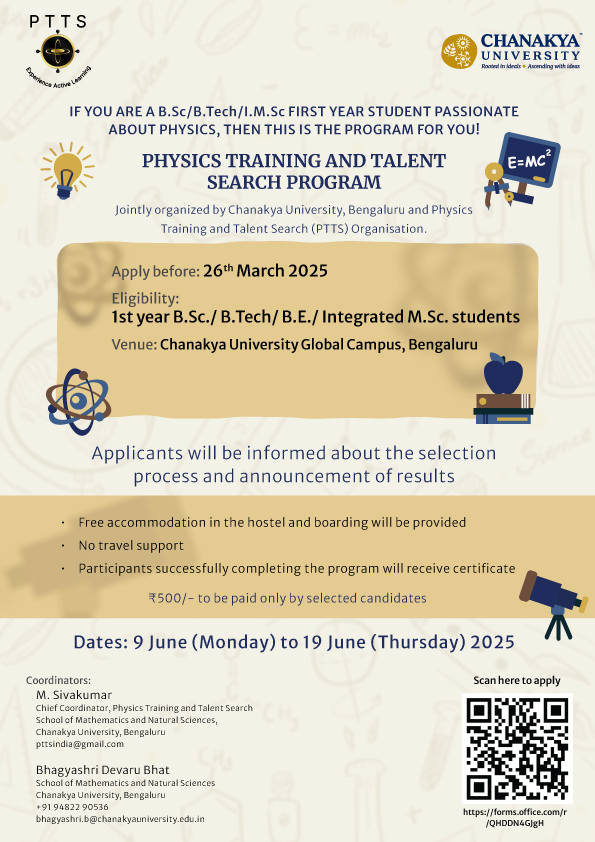Physics Training and Talent Search (PTTS) is a training program designed to nurture motivated undergraduate and postgraduate students, as well as teachers, through active learning methodologies. Our goal is to identify talented individuals and provide them with the skills, guidance, and exposure needed to pursue research careers in physics or excel in teaching roles.
Since its inception in 2015, PTTS has successfully conducted flagship programs, mini-programs, and teacher training workshops, despite interruptions in 2020 and limited funding in 2023–24. The program's unique methods aim to transform participants' approach to learning and teaching physics, benefiting their academic and professional journeys.
India's educational landscape is at a pivotal moment. While there are islands of excellence at the school and university levels, there remains a critical need to empower students and teachers in under-resourced institutions, particularly in rural areas. PTTS aims to bridge this gap by offering training programs that focus on critical thinking, collaborative problem-solving, and experimental physics.
We focus on higher education as it directly influences the quality of school teachers, researchers, and professionals who shape the nation's future. Our programs target college and university students, fostering intellectual growth at a stage where it can have the most significant impact.
Our teaching approach emphasizes 'learning how to learn' rather than rote memorization. For theory, we employ interactive, question-driven lectures, while tutorials foster peer collaboration. The experimental physics course challenges students to think like experimentalists—proposing, designing, and executing experiments using limited resources.
This methodology has consistently received positive feedback from participants, who report significant improvements in their understanding, problem-solving abilities, and confidence in pursuing academic or research careers.
Since 2015, PTTS has mentored students and teachers from diverse backgrounds, many of whom are now pursuing research or teaching careers in premier institutions across India and abroad. Alumni feedback highlights the program’s role in their academic growth and career trajectory.
We gratefully acknowledge support from organizations like the Infosys Science Foundation, IISER Pune, and ICTS Bengaluru, among others. Institutions interested in partnering with PTTS to host programs or fund initiatives are encouraged to contact us. These collaborations can serve as part of Corporate Social Responsibility (CSR) or Scientific Social Responsibility (SSR) activities.
For inquiries or partnerships, please reach out:
The first programme was held from December 18 to 30, 2015, at Kuvempu University, Karnataka, for around 50 B.Sc. III-year students selected from across India. This highly successful programme was funded by several research institutes and national science academies, motivating us to continue it annually. Since then, multiple programmes have been conducted at different venues.
To provide a platform for motivated students to interact with peers and experts in the field.
To identify talented students and nurture their talent for a research career in Physics.
Active learning is increasingly gaining recognition in western countries. For an insightful perspective, check the Interview with Carl Wieman, Nobel Laureate in Physics.
In this programme, teaching will adopt an interactive approach to encourage students to think critically, ask questions, and apply their understanding. Unlike traditional lecture formats, classes will not follow a conventional "chalk and talk" style. Instead:
The experimental physics course is designed to push students to:
Instead of pre-designed experiments, students will create and conduct their experiments from scratch.
While the course content remains largely traditional, the overarching goal is to train students to think like physicists.
To emphasize this innovative teaching methodology:

PTTS -2015 at Kuvempu University
PTTS 2016 at Regional Institute of education
PTTS-2017 Loyola College
PTTS-2018 National Institute of technology , Surathkal
PTTS-2019 Manipal Institute of Technology, Udipi
PTTS-2020 Cancelled due to the pandemic
PTTS-2021 Ahmedabad University(online
How to Apply